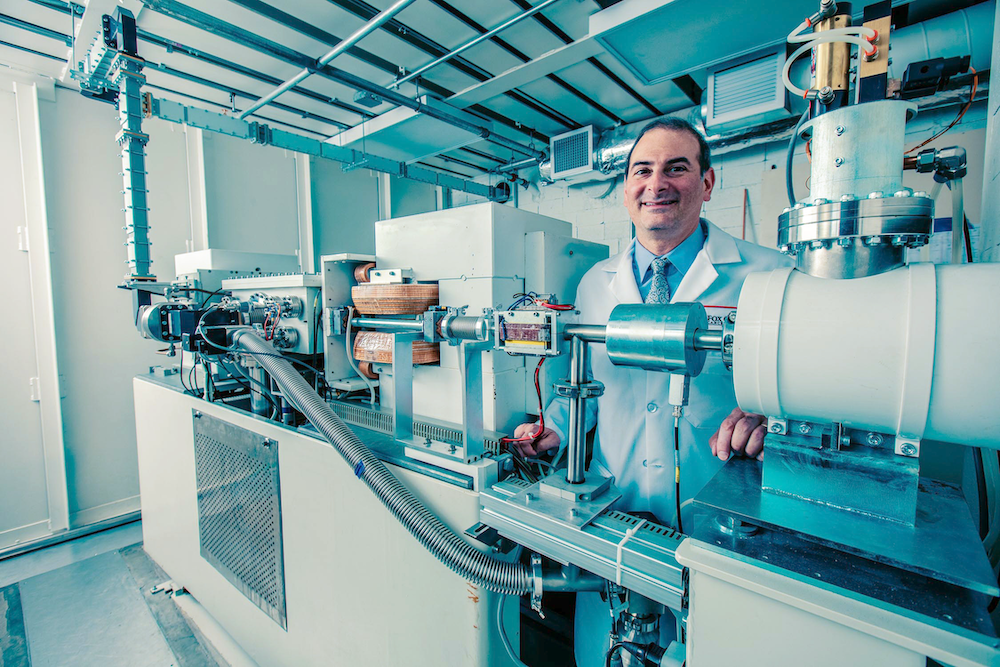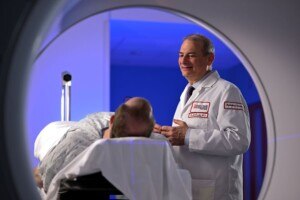Why This Philly Cancer Center Might Have a New Successful Way to Destroy Cancer Cells

Eric M. Horwitz, MD, with the Racetrack Microtron at Fox Chase Cancer Center.
When Fox Chase Cancer Center built its new radiation oncology suite in 2009, it had the foresight to leave a room the size of a tennis court completely empty: a placeholder for a future innovation in cancer care yet to arrive. More than a decade later, it’s finally here in Philly—now the only city in this half of the world to possess a Racetrack Microtron. This multi-million-dollar machine represents what could be a new frontier in cancer care. Here’s why:
It’s a whole new category of cancer treatment.
The Racetrack Microtron—a high-powered radiation machine—is an essential component to a brand-new approach to oncology known as radiodynamic therapy. Radiodynamic therapy uses targeted radiation to activate a drug given to the patient hours before treatment, thereby damaging the targeted tumor.
“Radiation is just used to activate the drug, which is absorbed by the targeted tumor deep within the body,” explains Eric M. Horwitz, MD, Chair of Radiation Oncology at Fox Chase. “This combination of therapies creates a completely different mechanism of action than other cancer treatments available today. The hope is that it will work on tumors that don’t currently have good therapeutic options. It’s literally a new way to treat cancer.”
The Microtron is the only of its kind in the Western Hemisphere.
In the past decade, Chinese scientists started experimenting with radiodynamic therapy with promising results, but the method had gone untested in North America until recently, when Fox Chase began its first phase I clinical trial. Both the Microtron and the drug it activates—5 aminolevulinic acid (5-ALA)—have previously received FDA approval in their own rights. This study will be the first to test the safety (and later, efficacy) of the combination according to U.S. standards of care.
Compared to standard radiation machines, the much higher-voltage Microtron creates enough energy to activate 5-ALA in areas deep within the body. “The total dose of radiation is quite low, but the energy of each beam is high,” says Joshua E. Meyer, MD, the radiation oncologist who treated the first patient using the Microtron at Fox Chase. “Because of that, it interacts with tissue in a different way.”
Radiodynamic therapy has the potential to treat a broad range of cancers.
Because of its unique approach, radiodynamic therapy has the potential to treat a number of different cancers. Tumors preferentially absorb 5-ALA, thereby allowing radiation from the Microtron to hone in on the area in question.
“We can expose that tumor to high energy levels and cause an interaction between the radiation and the drug. Our hope is that the combination will destroy the tumor,” says Anthony J. Olszanski, MD, RPh, a Fox-Chase oncologist and one of the principal investigators on this phase I trial.
It may trigger the immune system to help fight cancer.
Although the study has only just started, oncologists hope that radiodynamic therapy will not only target cancerous cells on its own, but it will also train the body’s own immune system to fight cancer, too.
“Typically, cancer is invisible to the immune system, but if we can irradiate a tumor in this fashion with radiodynamic therapy, we’re hoping to make it visible,” Olszanski says. “And if it’s visible, that means the immune system can then engage in other areas of the body and hopefully have an effect.”
It’s a new option for people who were out of options.
Because radiodynamic therapy is its own category of treatment, it has the potential to offer a new alternative to people whose cancer has previously resisted other methods. Even people who have undergone punishing rounds of radiation or chemotherapy could potentially benefit from the Microtron’s targeted, low doses, Meyer says.
His patient, the first in the trial, has metastatic rectal cancer and had already exhausted standard therapies. Meyer and his colleagues hope that radiodynamic therapy could add yet another tool to their arsenal when it comes to helping cancer patients like her.
“It goes with our mission being an NCI Designated Comprehensive Cancer Center that we want to push the envelope,” Horwitz says. “We want to come up with new ways to treat people with cancer because as good as we are, we can always do better.”
Learn more about how Fox Chase Cancer Center is at the forefront of cancer care.
This is a paid partnership between Fox Chase Cancer Center and Philadelphia Magazine
